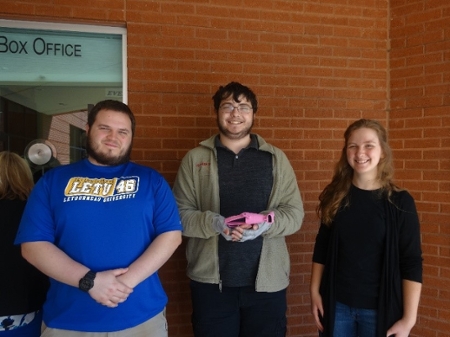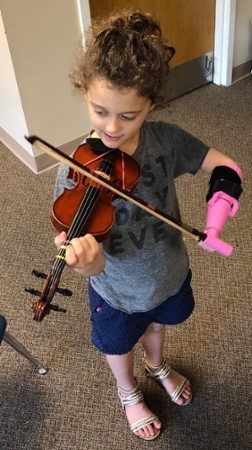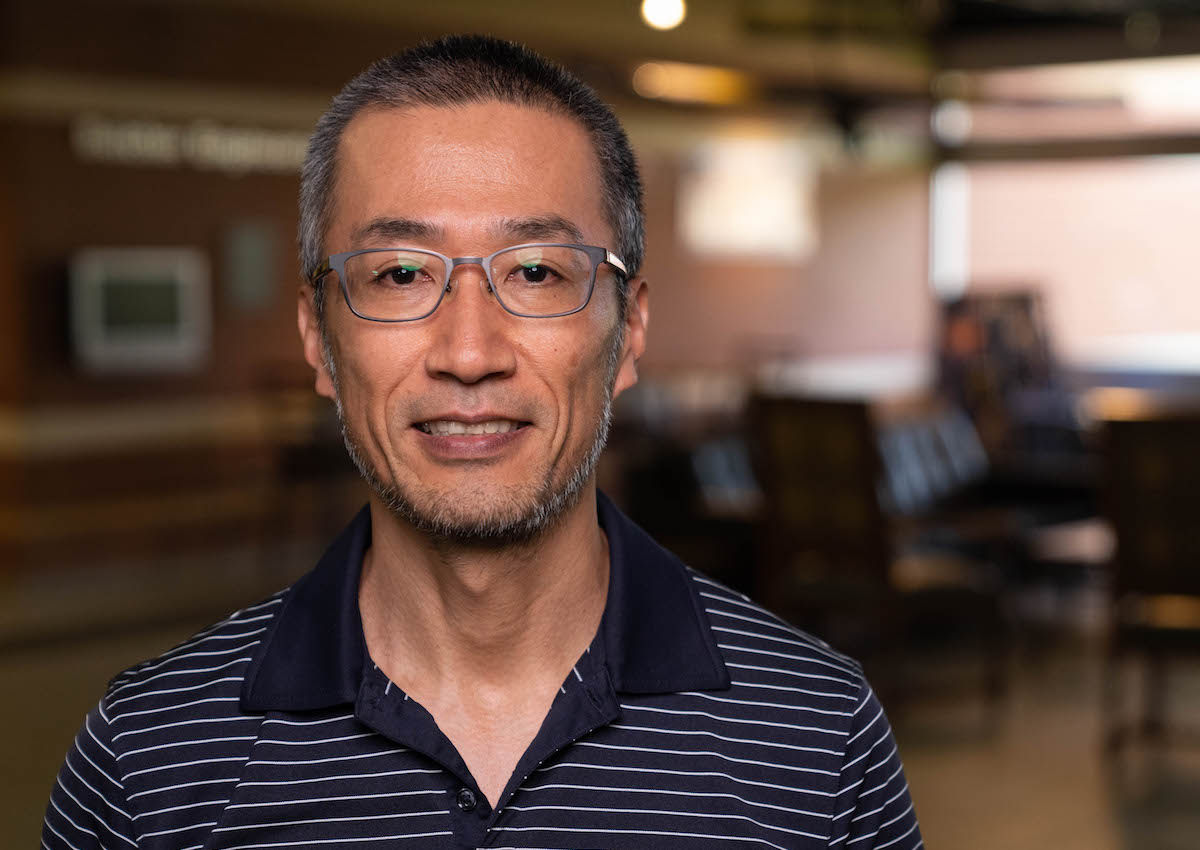Biomedical engineers work alongside other health care professionals in a wide range of capacities. They might perform research to improve our understanding of how the human body works, design new devices or techniques to diagnose and treat diseases, perform motion analysis to improve the performance of professional athletes, or develop new materials that are used to make prosthetics or implants more durable.
INTERESTING CLASSES YOU'LL TAKE
The curriculum Biomedical Engineering concentration consists of a broad interdisciplinary engineering core, supplemented with biology courses and completed with upper-level BME courses and research.
- Human Anatomy & Physiology
- Biomechanics
- Junior Biomedical Engineering Research
- Biosignal Analysis
- Biological Control Systems
To learn more about course requirements,
- view program details in our current catalog
- see our most recent suggested course sequence
- view the list of approved electives for this degree
PROJECT HIGHLIGHTS
Our biomedical engineering courses include hands-on projects in musculoskeletal biomechanics using research-grade equipment in Biomedical Engineering Lab. Our students will have research experiences in their Junior Biomedical Engineering Research I & II and Senior Design I & II. Some of their work has been presented at national academic conferences. Students pursuing a B.S. in Electrical & Computer Engineering, Biomedical concentration participate in a variety of senior design projects.
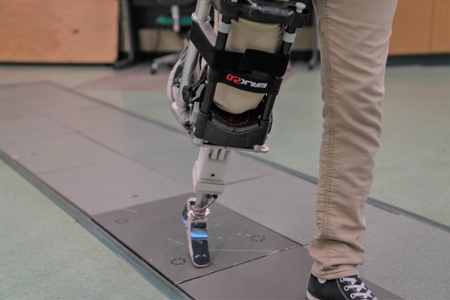
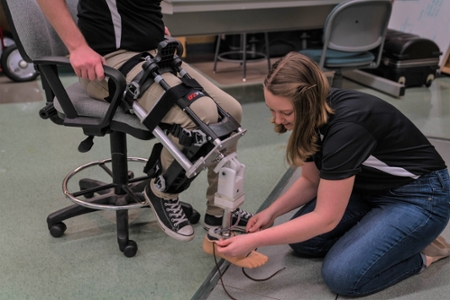
Research in the BME Program
Rehabilitation Engineering
Rehabilitation after sustaining neuromuscular disorders such as stroke and spinal cord injury is important to regain motor functions. One of the current research projects in the BME program is to design a gait rehabilitation device/system to facilitate neuroplasticity in the nervous system to enhance motor recovery, exploring a method called the operant conditioning of spinal reflex.
Low-back pain is one of the most prevalent health problems, affecting 85% of all people at some point in lifetime. Patients with low-back pain have limited lumbar range of motion (ROM). The lumbar ROM during activities of daily living is an important measure for physicians to know the effectiveness of pain-treatment, but there are no accurate measurement systems that patients can use at home. One of the current BME research projects is to develop such systems.
Prosthesis design and biomedical analysis
Amputation imposes a significant challenge on the patient in daily motor activities. Following transfemoral (above-knee) amputation, patients are prescribed with a prosthetic leg including the knee and ankle joints. One of the problems in a prosthetic knee joint is knee-buckling (unwanted sudden knee flexion) during weight-bearing, causing a fall. Our students have analyzed the biomechanics of transfemoral amputee gait and designed prosthetic knee joints aiming to reduce knee-buckling. Some of their work have been announced in national conference presentations:
Student Design Competitions
IEEE R5 Student poster competition 2022
The 2021-2022 BME senior design team won third place in the 2022 IEEE R5 Annual Student Poster Competition with LeTourneau Rehabilitation Engineering Project 2 (LETREP2). The LETREP2 device was designed to reduce spasticity in the calf muscles in patients with neurological disorders by applying operant conditioning of spinal reflex to induce neuroplasticity in the central nervous system. The R5 (Region 5) competition includes schools in Texas, Arkansas, Louisiana, Colorado, Oklahoma, Kansas, Missouri, and part of Illinois, Wyoming, North Dakota, Nebraska, and New Mexico.
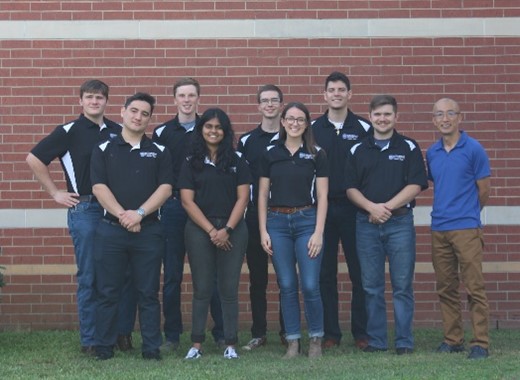
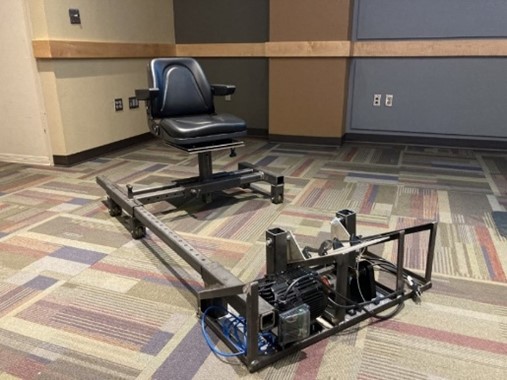
Rehabilitation Engineering and Assistive Technology Society of North America (RESNA) 2020
The 2019-2020 BME senior design team won third place in the 2020 Student Design Challenge with Prosthetic Energy Return Knee (PERK). The PERK knee was designed to reduce “knee-buckling” and facilitate smooth gait by incorporating a pawl-ratchet locking mechanism, electrical control systems, and surface friction damping.
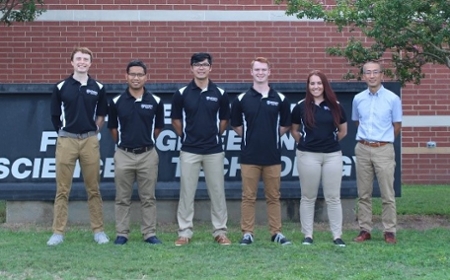
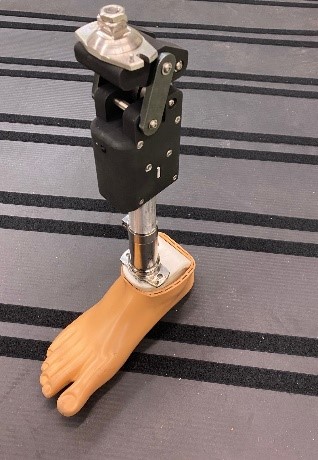
Engineering World Health 2020
Another 2019-2020 BME senior design team was honorably mentioned in the 2020 Engineering World Health Design Competition with their Portable Surgical Table. It was designed to provide a light-weighted yet sturdy, adjustable, and portable surgical table to be used in hospitals in under-resourced areas of the world. 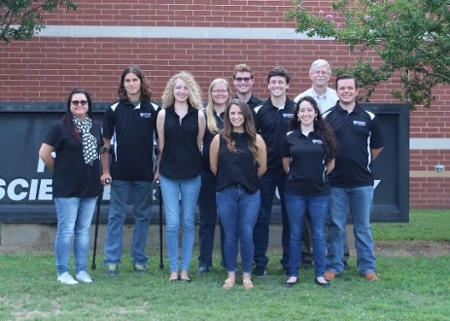
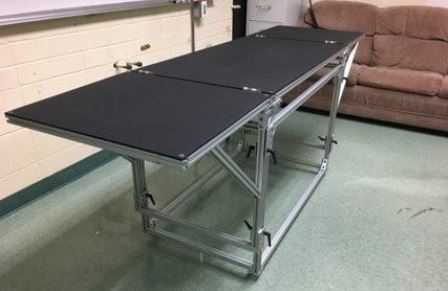
Engineering World Health 2019
The 2018-2019 BME senior design team won first place in the 2019 Engineering World Health Design Competition with their Noninvasive Hemoglobin Screening Device. The device was designed to provide an inexpensive and noninvasive device to monitor hemoglobin levels for people living in remote areas in southeast Asia. (Low hemoglobin concentration indicates anemia that is often caused by iron deficiency in the blood.) Their success was broadcast in a local TV news program (KETK News Story). LETU engineering professor and faculty advisor Dr. Paul Leiffer said he was particularly proud of the students for their first-place win, considering that this was the first year that LETU had entered the competition and that winners in the past five years included top-rated universities, including Purdue University, which had won first place in the international competition the previous two years.
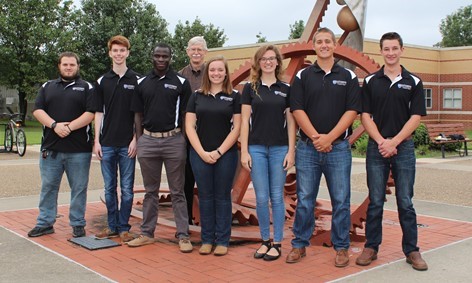
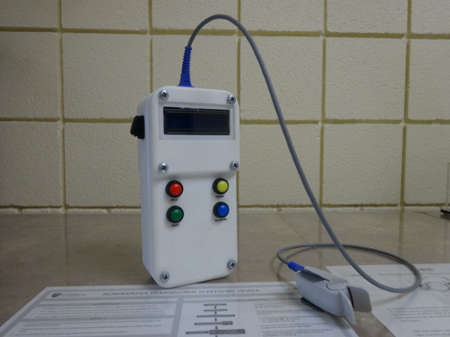
Class Projects
3D Printed Facilitation Device
Individual special-topic projects are also possible based on students’ interests. For example, a BME student has recently designed a 3D-printed facilitation device for a girl to play the violin.
If you would like to sponsor or be a mentor of one of our senior design teams please click here.
WHAT CAN YOU DO WITH THIS CONCENTRATION?
- Biomedical Engineer
- Quality Engineer, Medical Devices
- Manufacturing Engineer
- Research Engineer
- Design Engineer
With a degree in engineering with a biomedical concentration from LeTourneau University, you'll be equipped to find a fulfilling career in a dynamic, challenging environment right out of school. Biomedical engineering graduates are employed in universities, hospitals, medical research facilities and even government agencies. However, many LETU students also go on to study engineering at the graduate level or choose to enter medical school.
MEET THE FACULTY
Dr. Ko Sasaki
Program Coordinator Biomedical Engineering
Associate Professor, Biomedical Engineering
Biomedical Engineering Lab 360
Dr. Ko Sasaki, Associate Professor of Biomedical Engineering, introduces the Biomedical Engineering Lab and Biomedical program at LETU.
Check out the Engineering Labs Virtual Tour
